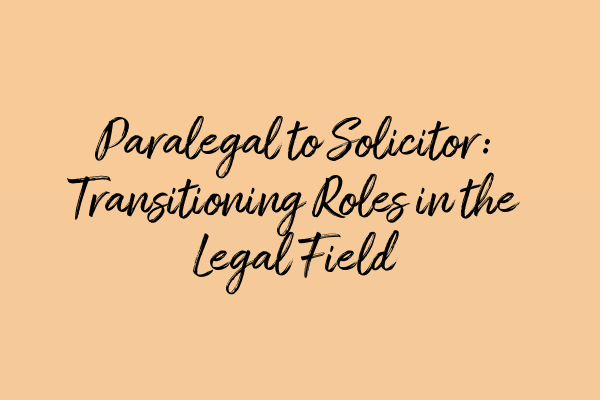Paralegal to Solicitor: Transitioning Roles in the Legal Field
Are you a paralegal looking to take the next step in your legal career? Transitioning from a paralegal to a solicitor can be a rewarding and challenging journey. In this blog post, we will explore the opportunities and steps involved in making this transition, as well as provide valuable insights and tips to help you succeed.
The Role of a Paralegal
Before we dive into the process of becoming a solicitor, let’s first understand the role of a paralegal. As a paralegal, you provide support to solicitors and barristers by conducting legal research, drafting documents, attending client meetings, and assisting with case preparation. Paralegals play a vital role in the legal profession, and their expertise is highly valued.
However, if you aspire to become a solicitor, it’s essential to recognize that there are key differences between the roles of a paralegal and a solicitor. Solicitors are qualified legal professionals who hold a practicing certificate and have the ability to provide legal advice, represent clients in court, and handle a wide range of legal matters.
Steps to Transition from Paralegal to Solicitor
Now that we understand the distinction between the roles, let’s explore the steps involved in transitioning from a paralegal to a solicitor.
- Educational Requirements: To become a solicitor in the UK, you must first obtain a qualifying law degree or a degree in any subject followed by a conversion course such as the Graduate Diploma in Law (GDL). After that, you’ll need to complete the Legal Practice Course (LPC) and secure a training contract.
- Training Contract: A training contract is a two-year period of supervised training. During this time, you’ll be exposed to different areas of law and gain practical experience under the supervision of qualified solicitors. Training contracts are highly competitive, so it’s essential to start researching and applying early.
- Professional Skills Course (PSC): Alongside your training contract, you’ll also need to complete the PSC. This course focuses on developing your professional skills, including advocacy, client care, and financial and business skills.
- Qualification: Once you have successfully completed your training contract and the PSC, you can apply to be admitted as a solicitor by the Solicitors Regulation Authority (SRA). This process involves completing the SRA’s character and suitability assessment and paying the necessary fees.
It’s important to note that the process of transitioning from a paralegal to a solicitor can take several years. However, with dedication and perseverance, it is possible to achieve your goal.
Tips for a Successful Transition
Here are some valuable tips to help you make a successful transition from a paralegal to a solicitor:
- Networking: Building a strong professional network is crucial in the legal field. Attend industry events, join legal associations, and connect with solicitors who can provide guidance and potential job opportunities.
- Continuing Professional Development (CPD): As a paralegal, seize opportunities to enhance your knowledge and skills through CPD courses and training. This not only demonstrates your commitment to professional growth but also strengthens your application for a training contract.
- Seek Mentorship: Find a mentor who can offer guidance and advice throughout your career transition. A mentor can provide valuable insights, help you navigate challenges, and offer support during your journey.
- Stay Informed: Keep up-to-date with current legal developments by reading legal publications, attending webinars, and staying active in professional online communities. This demonstrates your enthusiasm for the law and keeps you informed about changes that may impact your transition.
Transitioning from a paralegal to a solicitor requires dedication, commitment, and a proactive approach. By following these steps and tips, you’ll be well on your way to achieving your goal.
For more information on related legal topics, check out these articles:
- Private Prosecutions: Exploring Non-Governmental Prosecutions in Criminal Cases
- Understanding Drug-related Offences: Laws and Penalties in the UK
- Magistrates’ Court vs Crown Court: Different Paths in Criminal Proceedings
- Criminal Defence Strategies: Expert Approaches to Protecting Clients’ Interests
- Demystifying Criminal Law Procedures: A Step-by-Step Guide
Remember, transitioning from a paralegal to a solicitor is an exciting and challenging journey. Stay focused, remain proactive, and never stop pursuing your passion for the law. Good luck!


Leave a Reply